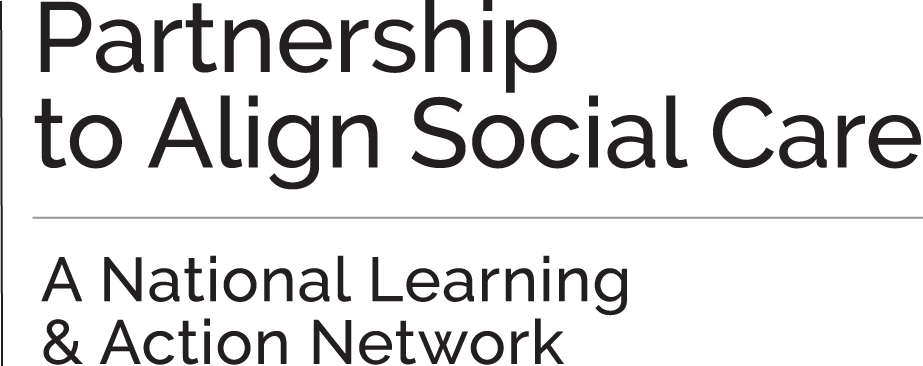“As one of the nation’s largest providers of Medicaid services, CommonSpirit works with community-based organizations in more than 21 states because we believe it’s critical to the health of the communities we serve,” said
Ji Im, MPH, senior director for community and population health for CommonSpirit and leader of one of the Partnership to Align Social Care’s work groups. “Through our participation in the Partnership, we are bringing decades of best practices to help create a blueprint for the integration of health care and social services.”
Research shows that aligning health care with organizations that connect people to community resources–childcare, jobs, housing, nutrition, and transportation–measurably improves the overall health of the population and can impact
up to 80 percent of health outcomes.[1] The Partnership to Align Social Care was established to help create efficient networks that share information, are owned by the community, and supported by all the agencies, institutions, and businesses that are involved in improving health.
“CommonSpirit has been foundational to forming our Partnership and helping define its mission,” said June Simmons, MSW, Partnership to Align Social Careco-chair and Partners in Care Foundation CEO. “As a leader of one of our key workgroups, CommonSpirit is helping to convene diverse stakeholder groups to co-design a model that can be implemented across the country to create healthier communities.”
Founding organizations include health plans such as Aetna CVS Health, Elevance Health, Humana and United Healthcare; integrated delivery networks such as Kaiser Permanente; health systems including CommonSpirit and Rush University Medical Center; community-based organization (CBO) networks including the Detroit Agency on Aging, Partners in Care Foundation, and the Camden Coalition of Healthcare Providers. Liaisons from several federal agencies including the Administration for Community Living (ACL), the Center for Medicare & Medicaid Innovation (CMMI), and the Office of the National Coordinator for Health Information Technology (ONC) advise this effort.
Through the Partnership, organizations that may not typically work together have established a forum to create a framework that will build and sustain the capacity of CBO networks to provide social services. The Partnership will focus on priority issues including:
- Co-designing common standards for effective and sustainable partnerships of CBO networks, health plans, and health systems
- Identifying core attributes and competencies for CBO network credentialing
- Identifying/encouraging widespread use of existing billing codes and essential elements for a streamlined contracting process between health systems, health plans, and CBOs
- Making recommendations for infrastructure capabilities and financing for more sustainable CBO networks
CommonSpirit’s participation in the Partnership leverages its work in initiating and advancing models to close the gap between medical and non-medical providers and create a continuum of care so that patients receive the services they need to reach their greatest health potential. These include the Connected Community Network (CCN) model, which has been implemented in more than 20 different markets, to bring together diverse stakeholders to create an infrastructure for connecting underserved populations with the community resources they need. CCNs include shared governance and an innovative “community bank” concept, which creates a sustainable funding mechanism: funding partners contribute to the community bank and share in community infrastructure costs. Similarly, CommonSpirit has partnered with Pathways Community HUB Institute (PCHI) on a collaborative, outcome-based payment model for community health workers that complements the CCN and involves many of the same types of organizations and institutions.
About CommonSpirit Health
CommonSpirit Health is a nonprofit, Catholic health system dedicated to advancing health for all people. It was created in February 2019 by Catholic Health Initiatives and Dignity Health. With its national office in Chicago and a team of over 150,000 employees and 25,000 physicians and advanced practice clinicians, CommonSpirit operates 140 hospitals and more than 1,500 care sites across 21 states. In FY 2021, CommonSpirit had revenues of $33.3 billion and provided $5.1 billion in charity care, community benefit, and unreimbursed government programs. Learn more at www.commonspirit.org.
About Partnership to Align Social Care
The Partnership to Align Social Care—A National Learning and Action Network (Partnership), is a unique collective commitment to achieve meaningful alignment of health care and social care systems. The Partnership includes leaders among community-based organizations, health plans and systems, national associations and advocacy organizations, philanthropic organizations, foundation, academic institutions, federal agencies, and other key participants collaborating to co-design a strategy to enable successful partnerships between health care organizations and networks of community-based organizations (CBOs) delivering social care services delivering health-impacting social care. The Partnership aims to align with the CMS Innovation Center Strategy Refresh and aspires to support health and social care delivery system transformation that enables value-based care. Core components include shared governance, sustainable financing, multi-stakeholder accountability, and policy changes at the federal, state, and local levels. Learn more at www.partnership2asc.org.
[1] https://www.rwjf.org/en/library/research/2019/02/medicaid-s-role-in-addressing-social-determinants-of-health.html


